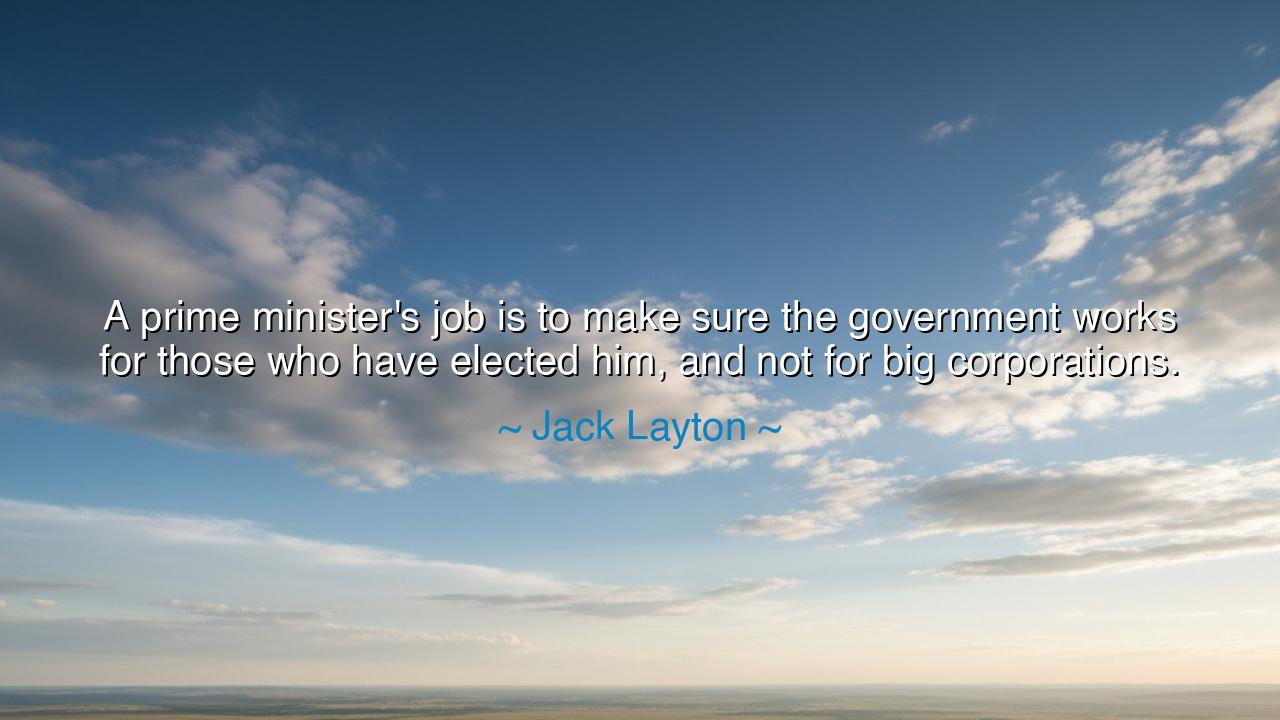
A prime minister's job is to make sure the government works for
A prime minister's job is to make sure the government works for those who have elected him, and not for big corporations.






"A prime minister's job is to make sure the government works for those who have elected him, and not for big corporations." — Jack Layton
In this bold and righteous declaration, Jack Layton, the beloved Canadian statesman and champion of the common people, speaks with the voice of justice echoing through the ages. His words strike at the heart of what true leadership means — that the power entrusted to a ruler is not for personal gain, nor for the enrichment of the mighty, but for the service of the people who placed their faith in him. A prime minister, or any leader, is but a steward of the public will, a guardian of the humble and the unheard. When Layton warns against rule by big corporations, he reminds us that the greatest danger to democracy is not open tyranny, but the quiet corruption of influence — when wealth whispers in the ears of the powerful and drowns out the voices of the many.
Jack Layton lived and spoke in an age when the line between government and business had grown perilously thin. Across nations, the cries of ordinary citizens were too often ignored, while the powerful carved policies to suit their own profit. Layton, a man of conviction and compassion, rose to declare that this must not be the way of governance. He believed, as did the ancient philosophers, that leadership is a sacred trust, and that to betray the people’s confidence is to offend both justice and the soul of the nation. In his words resounds a timeless truth: the ruler is a servant, not a master; and when he forgets this, the republic begins to decay.
The wisdom of Layton’s words stretches back far beyond his time. The ancients knew well the poison of greed in governance. In the city-states of Greece, Solon of Athens once warned that when the rich bend the laws to their will, the city is soon undone. The poor grow resentful, the noble grow arrogant, and the harmony of the state is lost. Solon, like Layton, sought to restore balance — to remind rulers that the wealth of a nation lies not in its gold, but in the dignity and well-being of its people. History has shown again and again that when rulers serve the powerful few, they sow the seeds of revolution. When they serve the many, they plant the roots of peace.
Think, too, of the tragedy of ancient Rome, when once-great republicans yielded to the seductions of wealth and empire. Senators, once bound by duty to the people, began to sell their loyalty to the highest bidder. Great estates devoured the small farms, and the citizens who had once been Rome’s pride became beggars in their own land. The republic fell not to the sword of an invader, but to the slow rot of corruption within. Thus Layton’s warning burns with prophetic force — for when the state ceases to serve the people and becomes a servant of the wealthy, freedom dies not with a cry, but with a handshake in the halls of power.
Yet Layton’s tone was not one of despair, but of hope and renewal. He believed deeply in the possibility of righteous governance, where the halls of parliament could once again echo with the laughter and struggles of ordinary people. His vision was not of a world divided between rich and poor, but of one united by fairness, compassion, and shared purpose. To him, the work of government was like the tending of a garden — the strong must shelter the weak, the rich must aid the poor, and every citizen must be given the chance to grow. In this vision, the prime minister is not a ruler upon a throne, but a gardener of justice, kneeling in the soil of his nation’s heart.
And so, O listener and reader, take these words to heart, for they speak to every age and every people. The health of a nation depends not only on its laws, but on the virtue of those who lead and the vigilance of those who are led. When the people forget their power, they become easy prey for the powerful; but when they remember it, they become the heartbeat of freedom itself. The task of governance is sacred, but so too is the duty of citizenship. To demand honesty, to hold leaders accountable, to raise one’s voice for justice — these are not acts of rebellion, but of love for one’s country.
Lesson: True leadership exists to serve the people, not the privileged. A government that forgets its duty to the many and serves the few betrays the very purpose of its existence.
Practical Action: As citizens, do not fall asleep in comfort or cynicism. Learn, question, and hold your leaders to the light of truth. Support policies that lift the weak, not only those that enrich the strong. Celebrate leaders of integrity and reject those who trade your trust for gold. For the destiny of a nation lies not in the hands of the powerful alone, but in the hearts of its people — vigilant, virtuous, and unafraid to demand that government be, once more, the servant of the people.






AAdministratorAdministrator
Welcome, honored guests. Please leave a comment, we will respond soon